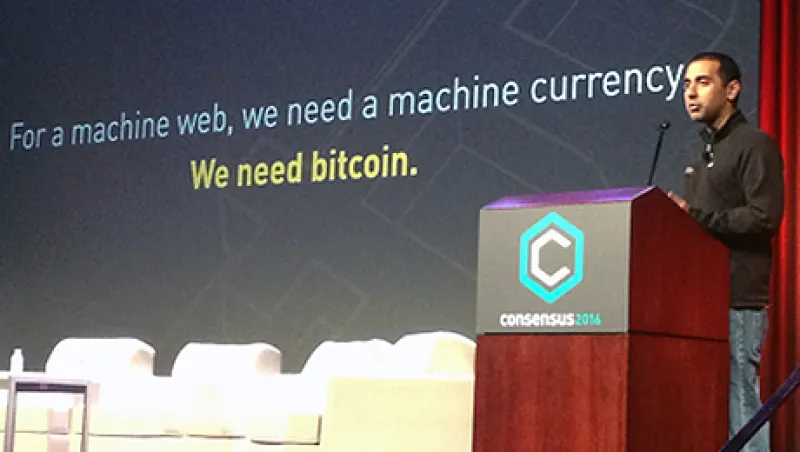Picture a world where machines barter for resources using their own virtual currency. That may sound like science fiction, but Balaji Srinivasan and 21, his San Francisco–based Bitcoin start-up, are working to make it a reality.
In New York this month at Consensus 2016 — a conference dedicated to blockchain, the decentralized transaction ledger underlying the notoriously volatile cryptocurrency — Srinivasan unveiled new software aimed at helping developers build applications based on Bitcoin transactions. These apps will one day replace the paywalls and registration forms governing access to online content, he believes.
“I think what happens over the next five to ten years is Bitcoin becomes the currency of the Internet, for machine payments and things like that,” Srinivasan said on a panel. “Then, over the next 20 years, it becomes the currency of the next world, which is [virtual reality]. That’s where I think things really happen, once you start spending more time in VR than on the ground.”
In this hypothetical digital economy, computers could send and receive Bitcoins as hassle-free payment for online services or even for renting out unused computing power. Rather than sell advertisements or hoist a paywall, a website could charge Bitcoins for each visit. “Every time you load a web page is a HTTP request,” Srinivasan said. “That’s a lot of HTTP requests. If you are earning Bitcoin on every HTTP request, that could be a lot of earned Bitcoins.”
Linking machines through payments is what Srinivasan calls the machine web. In his view it’s the next step after the World Wide Web, which connected content through web pages and hyperlinks, and the social web, which brought people together through networking sites like Facebook and LinkedIn.
After completing a Ph.D. in electrical engineering at Stanford University in 2006, Srinivasan began teaching data mining, statistics and computational biology at Stanford, where he co-founded San Francisco–headquartered genetics testing company Counsyl with friends from graduate school in 2008. In 2013 he became a general partner at Andreessen Horowitz and co-founded 21, which has since secured $120 million in venture funding — the most of any Bitcoin company — from a who’s who of fintech financiers including Andreessen Horowitz, Khosla Ventures, PayPal Holdings co-founder Peter Thiel and Cameron and Tyler Winklevoss.
Srinivasan and his backers think the ability to generate, or mine, Bitcoins will join wireless Internet and Bluetooth technologies as a standard feature of digital devices. Last September, 21 released its first consumer product, a $400 computer equipped with a Bitcoin-mining chip and software built into a Linux operating system that allows the machine to send and receive the currency.
At Consensus 2016 in a keynote speech that he said was “more aimed at the hoodies in the audience versus the suits,” Srinivasan, sporting jeans and a black fleece quarter-zip sweater branded with the Andreessen Horowitz logo, announced that the software is available for free download. “Every computer is now a Bitcoin computer,” he declared. However, 21 only offers Mac and Linux versions of the program right now. Sorry, Windows users, you’ll have to wait.






